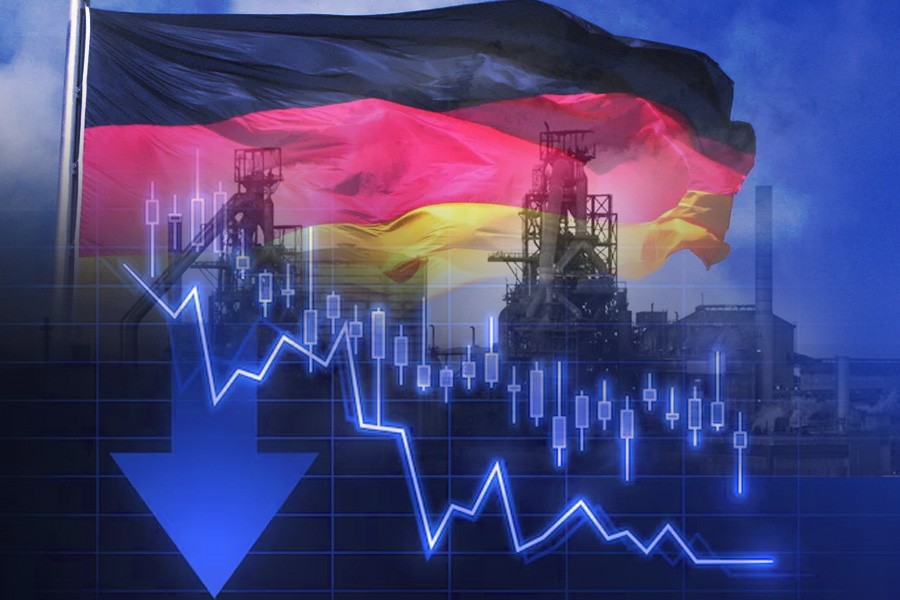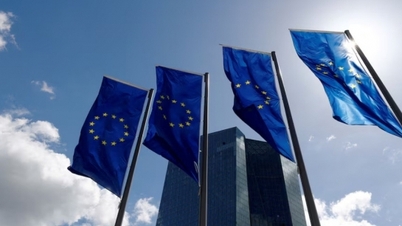Germany, Europe's growth engine, continues to face a series of economic challenges, shaking its already weak recovery momentum into 2024.
 |
| The German economy shrank 0.1% in the second quarter, after growing 0.2% in the first four months of the year, according to Destatis. (Source: Collage The Gaze) |
The German economy and economic sentiment across the eurozone took a nosedive in August, hit by a global trade slowdown, stock market volatility and tensions in the Middle East.
The economic sentiment index of the Center for European Economics (ZEW) - an important indicator assessing the expectations of financial experts, "free-fall" from 41.8 points in July to only 19.2 points in August.
The downbeat sentiment reflects growing pessimism about the outlook for Europe's powerhouse economy and highlights broader concerns for the eurozone as a whole.
German and Eurozone economic expectations worse?
The problem here is that this unexpected decline in sentiment, not only was lower than market expectations of just 32 points, but marked the sharpest monthly decline since July 2022.
Similarly, economic sentiment in the eurozone also deteriorated significantly, with the corresponding index falling from 43.7 to just 17.9 points, its lowest since February and well below the expected reading of 35.4. The 25.8-point drop represented the worst monthly decline in economic sentiment in the bloc since April 2020.
The assessment of Germany's current economic situation also worsened, with the relevant index falling 8.4 points to minus -77.3. However, the Eurozone economic situation index showed a slight improvement, rising 3.7 points to minus -32.4.
Europe's leading economy has faced a series of challenges that have shaken its already fragile recovery into 2024. A slowdown in global trade, exacerbated by weak demand in key markets like China, has weighed heavily on Germany's export-driven economy.
"The German economic outlook is collapsing. In the current survey, we see the sharpest decline in economic expectations in two years," said Prof. Dr. Achim Wambach, President of ZEW, about the survey results. Mr. Wambach stressed that ongoing uncertainty, due to ambiguous monetary policy, disappointing business data and, abroad, escalating tensions in the Middle East also contributed to the unsettled mood.
"Most recently, the uncertainty has also been reflected in the turmoil on international stock markets," he added. The ZEW survey showed that the deterioration in sentiment was evident in the main stock market indices, with the morale of professionals in the DAX and STOXX 50 down 6.5 and 4.6 points respectively.
Financial market analysts also turned bearish on the dollar, predicting that the weakening economy and the possibility of a rate cut by the Federal Reserve will continue to put pressure on the greenback. The sentiment index for the strength of the dollar against the euro fell 24.2 points from the previous month to -7.9 points.
By sector, sentiment declined across most major sectors. The most significant declines were seen in economically sensitive sectors such as retail and consumer goods, down 24.2 points, reflecting concerns about weakening consumer demand amid high inflation and rising interest rates. Other sectors that also fell sharply included electronics, down 18.1 points, and chemicals and pharmaceuticals, down 17.2 points.
Europe's "sick" locomotive
This is the second time in a quarter of a century that Germany has been called the “sick man of Europe.” Germany is still the largest economy in Europe, but one of the weakest in the region.
German manufacturing is heavily dependent on global trade. The German economy is more dependent on exports than other developed countries, with industrial production accounting for a large proportion of the economy, and the country's key manufacturing sector (automobiles) in particular has become overly dependent on the Chinese market and has been slow to adapt to the rise in demand for electric vehicles.
In the short term, the European locomotive has faced continuous headwinds, global trade has weakened, China's growth has been struggling, and it has lost cheap energy supplies from Russia due to the Russia-Ukraine conflict.
Analyzing the situation, expert Tim Wollmershauser, Head of Forecasting at the Ifo Institute - a leading German research organization, commented: “As a business address, Germany has lost its competitiveness in recent years. In addition to high energy prices, a number of other factors have led to this situation, including a high and unchanged tax burden, increasing administrative costs, slow digitalization and a worsening shortage of highly skilled labor...
Meanwhile, China’s demand for German industrial goods is expected to weaken permanently as the world’s second-largest economy shifts toward a greater role for domestic manufacturing. And the consequences of overreliance on Russian gas have become clear over the past two years, exposing the “Achilles heel” of the German growth model.
Key EU members are closely watching what happens in Berlin. The outlook is not promising at the moment. Consulting firm BCA Research believes that a slowdown in German growth could drag down the eurozone or have spillover effects on other economies, such as France or Italy.
The engine of global growth over the past 12 months has seemingly bypassed Europe, which is struggling with the consequences of high energy prices, high interest rates to control inflation and weak consumer confidence.
The latest figures show that the Eurozone economy is growing slowly but steadily. However, this is not true for Germany. A comparison of the four largest economies in the Eurozone also shows clear differences. The Spanish economy grew particularly strongly, with GDP up 0.8%, the French economy grew 0.3% and Italy 0.2%. In contrast, the German economy contracted, with GDP -0.1%.
Source: https://baoquocte.vn/bi-bo-lai-phia-sau-bi-quan-bao-trum-kinh-te-duc-dang-keo-lui-ca-khu-vuc-dong-euro-282678.html


![[Photo] Readers line up to visit the photo exhibition and receive a special publication commemorating the 135th birthday of President Ho Chi Minh at Nhan Dan Newspaper](https://vphoto.vietnam.vn/thumb/1200x675/vietnam/resource/IMAGE/2025/5/17/85b3197fc6bd43e6a9ee4db15101005b)
![[Photo] Nearly 3,000 students moved by stories about soldiers](https://vphoto.vietnam.vn/thumb/1200x675/vietnam/resource/IMAGE/2025/5/17/21da57c8241e42438b423eaa37215e0e)


![[Photo] More than 17,000 candidates participate in the 2025 SPT Competency Assessment Test of Hanoi National University of Education](https://vphoto.vietnam.vn/thumb/1200x675/vietnam/resource/IMAGE/2025/5/17/e538d9a1636c407cbb211b314e6303fd)
![[Photo] Prime Minister Pham Minh Chinh chairs meeting on science and technology development](https://vphoto.vietnam.vn/thumb/1200x675/vietnam/resource/IMAGE/2025/5/17/ae80dd74c384439789b12013c738a045)
































































































Comment (0)